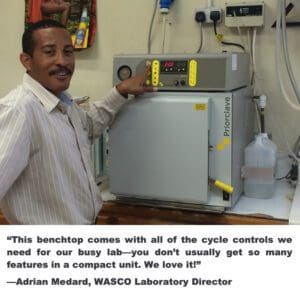Building Biotech Capacity in Guyana and the Global South
By: Priorclave North America
Category: Lab Innovation

The Global South is playing an increasingly important role in the world economy. For example, while the Global South as a whole was only responsible for around 25% of total international trade in 1980, it now accounts for half or more of all international trade, and more than half of the world’s economic growth.
But nations in the Global South have rarely enjoyed the full benefits of their contributions. Cultivating scientific talent and building research capacity in the Global South is one way to rectify this imbalance—and a key focus of many of the region’s leaders.
Guyana is a perfect example. Over the past decade, biotechnology has become a major focus in Guyana, especially agricultural biotech. The Guyana Rice Development Board (GRDB) has created a variety of hearty rice varieties, while Guyana’s National Agricultural Research and Extension Institute (NAREI) has been guiding research and development of laboratory protocols for plant tissue culture and in-vitro micro-propagation and storage (largely for cassava, pineapple, yam, sweet potato, and plantain). Their goal is to facilitate cross-border transfer of genetic material, both for economic benefits and to improve regional food security.
But like many of their neighbors, Guyana has struggled to expand in these areas. In 2013 the Guyana Chronicle noted that “the application of biotechnologies in the country as a whole in the industrial, medical and environment sectors [has been] limited due primarily to the lack of technology and expertise.”
Supporting Agri Tech Research in Guyana and the Global South
In January of this year, Guyana’s President Irfaan Ali announced the creation of a joint regional Agri Tech Campus in Guyana with support of the Indian government and Bangalore Bio-Innovation Centre. This initiative will bring both resources and capital investment to Guyana, in addition to helping to build and retain Guyanese biotech talent. It will also accelerate larger plans to enhance Caribbean food security over the next two years.
For decades, Priorclave has enthusiastically supported research throughout the Global South, with dozens of autoclave installations across Africa, Southeast Asia, the Middle East, and Latin America.
This starts with designing and building a robust, cost-efficient, energy-efficient autoclave that is reliable and easy to maintain. Priorclave then supports that autoclave and its users with a network of local distributors and factory-trained authorized service agents (ASAs). For example, for years Priorclave has supported WASCO’s St. Lucia water quality lab.
With these latest initiatives in Guyana, Priorclave looks forward to working with more labs in the region.
As Barbra Wells, CEO of Priorclave’s North American division, explains, “One of the things I’ve always appreciated about Priorclave is the commitment to supporting research that increases global sustainability. Part of that is making efficient autoclaves with a long working lifespan. But more important are our efforts to support the development of local facilities and expertise for biotech, agricultural, and pharmaceutical research, development, and production. Having talent and tools as close as possible to the communities who will benefit from those products and research is a key aspect of global sustainability.”


